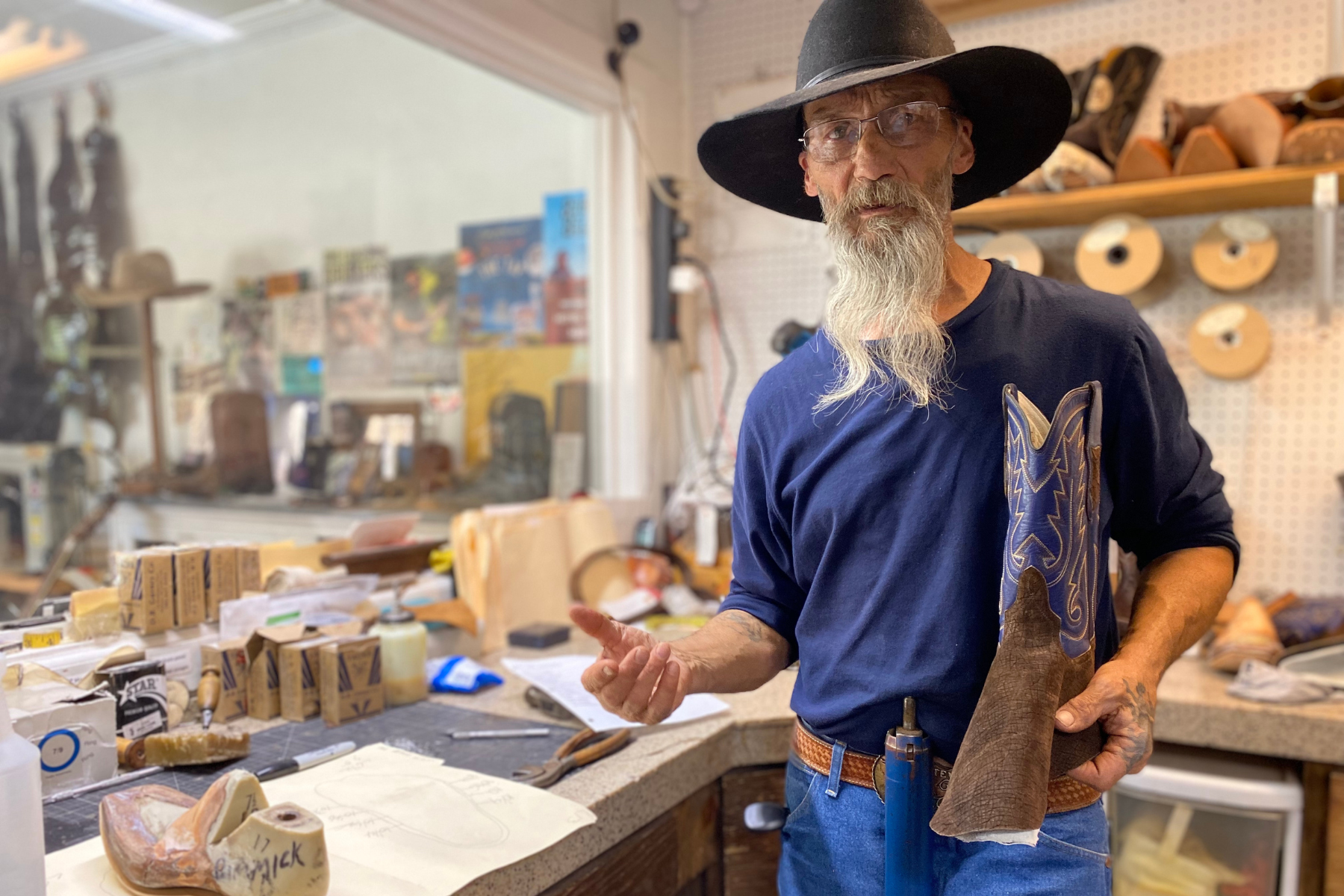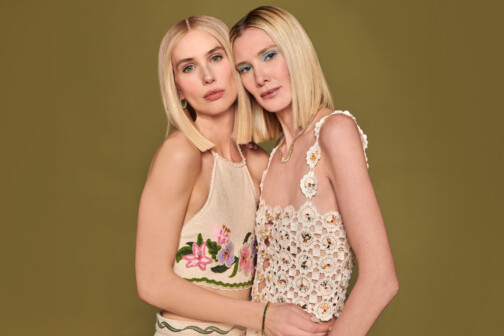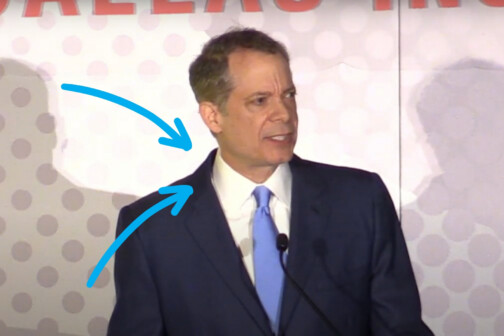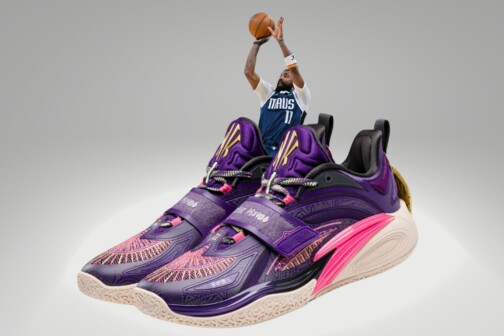When Steven Parker leans back in his chair to tell the story of his life, he has the look of an old cowboy recounting tales by the fire. He wears a cattleman’s hat, a pair of boots, and a big, engraved metal belt buckle. He’s got tattoos on his tanned arms and hands. A scraggly gray beard reaches his chest. His voice has an outlaw country twang to it.
But Parker, 60, isn’t a cowboy. Officially, he never has been. Instead, he’s carved and shaped a name for himself as a cowboy bootmaker.
Since 2004, Parker has operated Morris Boot Co., a custom cowboy boot shop across the street from Fort Worth’s Dickies Arena. Walking into his small shop is like dousing yourself in a coppery, leather-scented cologne. Animal skins are strung up on the walls, draped across chairs, and rolled up in old wooden barrels. There are music posters and cowboy boots everywhere, propped on displays and lined up by the front window. The copper aroma comes from the “grand floor,” which is tiled with $1,000-worth of pennies.
In the back, half-finished boots and wooden lasts (foot-shaped forms) are piled on shelves above his beat-up equipment. Scattered across the countertops and stuffed into drawers are sole pattern pieces cut from plain manilla folders. There’s a light dusting of baby powder, which Parker uses to mark out the first line of stitching on the leather. If Santa were a cowboy, this could be his workshop.
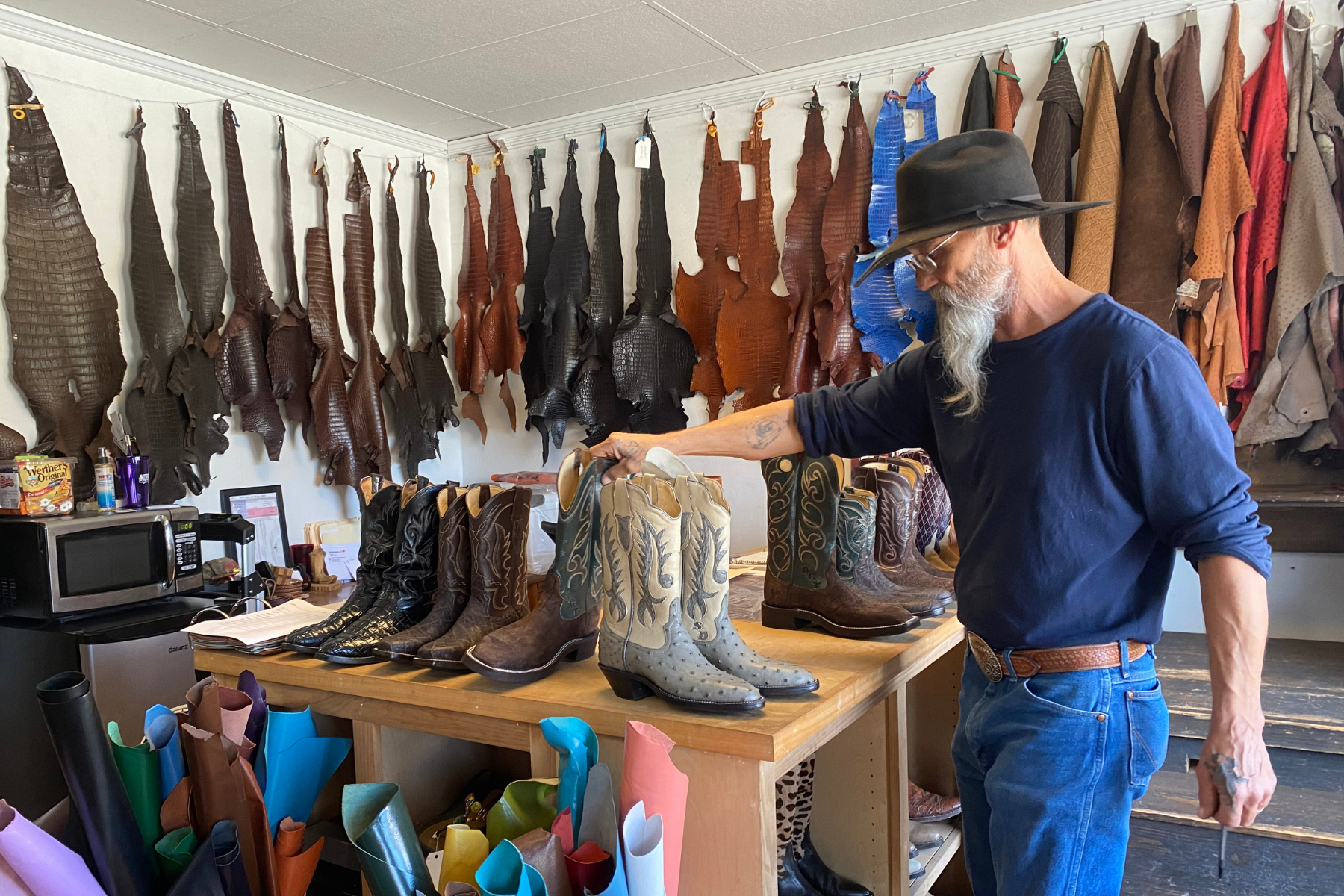
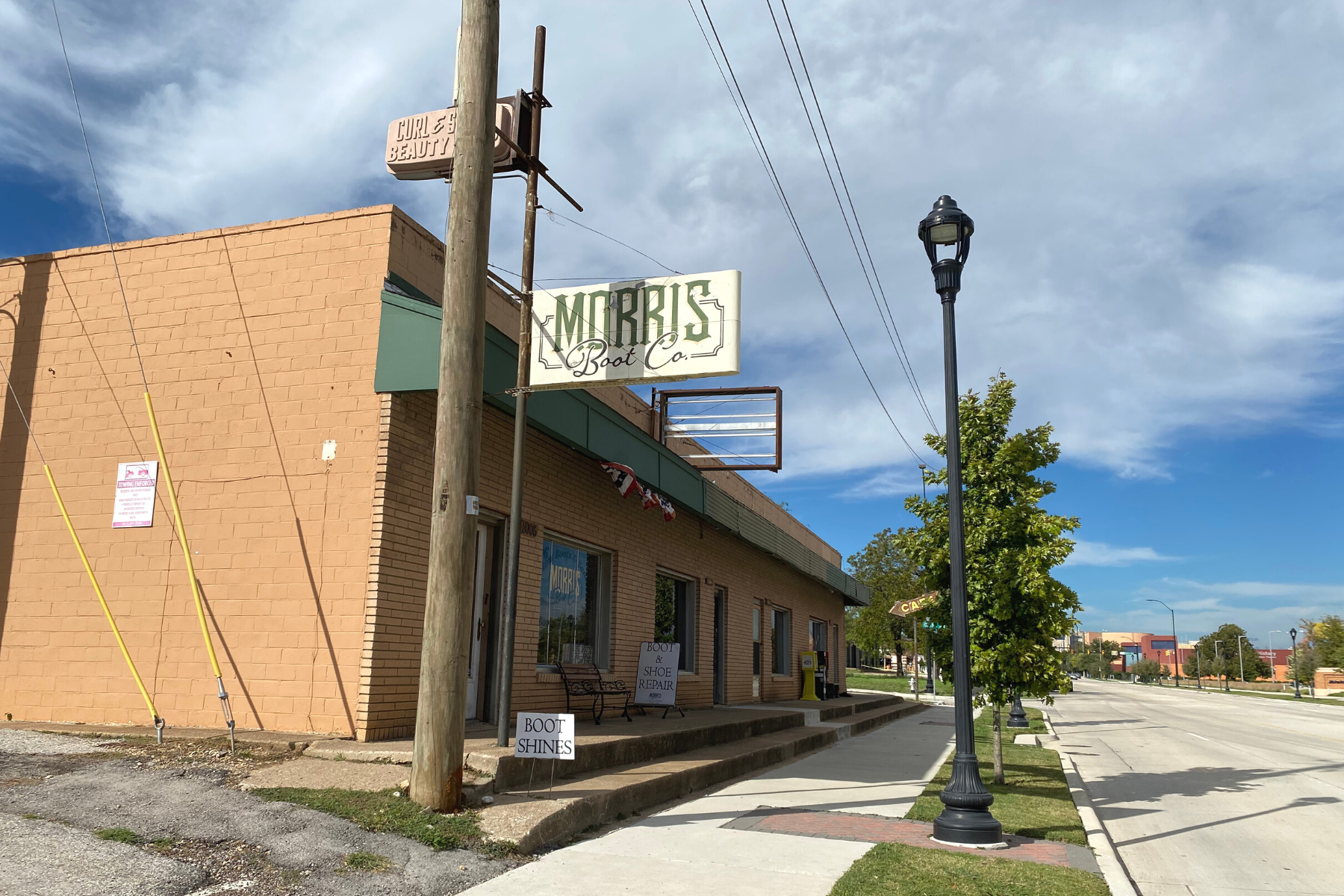
Parker has always had what he calls the “cowboy spirit.” He got his first pair of cowboy boots from M.L. Leddy’s when he was 10, and “wore them things until they fell apart.” He and his buddies spent the 1970s out on ranches in Grapevine, riding bulls and horses. But his family moved to Fort Worth when he was a teenager. Missing the country, Parker got a job herding cattle in and out of the auction barns at the Stockyards.
An old cowboy in the back of the barn taught him how to tool (carve patterns) leather in their free time. Parker began carving leather for his friend’s family Western furniture store. In 1978, He spent ages tooling a large mural on the back of a couch for another old cowboy named David Kelly. When he finished, they shipped it out to Dalhart, a small ranching town in the Texas panhandle, about 85 miles northwest of Amarillo.
Not long after, Kelly traveled down to Forth Worth to meet Parker. In his 70s, Kelly “looked ancient,” Parker recalls, who was 17 at the time. But Kelly was impressed with the teenager’s skill, and had a proposition for him: How would Parker like to come back with him to Dalhart and learn to make cowboy boots?
“I couldn’t think of anything funner than learning how to make cowboy boots,” Parker says.
Parker spent around nine months working with Kelly on an XIT ranch in Dalhart. During the day, they were “overall repairmen,” fixing fences, saddles, bridles, and more. At night, they’d borrow the rancher’s tools to make boots. “He didn’t make that pretty of a boot, but he made them fit real good,” Parker says.
The secret, he argues, is to measure the foot while sitting and standing. Parker’s very first handmade boots were deer hide and a far cry from the carefully sculpted boots coming out of his shop nowadays. “They were pretty ugly. [Reminded] me of a Fred Flintstone-era boot,” he says. “I sure was proud of them.” Decades later, he still has that first pair—his wife Melissa uses them as a flower vase.
The memories Parker has of working with Kelly are “magical and majestic.” Kelly became a father figure to him, imparting wisdom as they worked. “Everything that he taught me about boots, you can supplement it into life in the same way,” Parker says. Always do things the same way, Kelly would say, but work the kinks out. Parker didn’t always understand the meaning, but just like the boots, the lessons lasted.
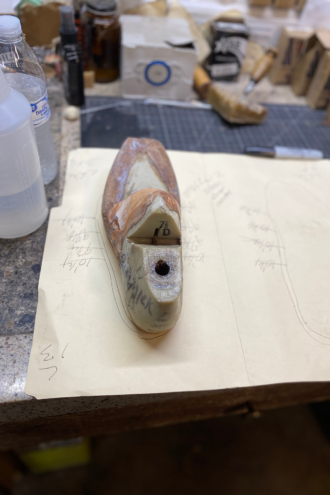
“There’s 224 steps to making a pair of boots,” Parker says. “About three-quarters of that are mathematical equations.”
Catherine WendlandtParker spent years working out the kinks of his design. “I got real meticulous about my designs, my patterns, and the outcome of the final look of my boots,” he says. He made boots as a hobby for friends, working with cheap deer, bull, and buffalo leathers. For money, he worked as a house framer for 25 years. After he started dating Melissa in the early 2000s, she encouraged him to follow his passion and become a fulltime bootmaker. He doubted he could make a living that way, but eventually he gave in and got a job at a local boot company.
There, he met a young TCU student named John Morris who worked for free “because he just loved boots.” The pair became fast friends. Morris later opened Morris Boot Co., but by 2004, was ready to shut it down. “No hang on, let me run it,” Parker told him. The two got into business together. Parker eventually took over ownership in 2010 and now runs the whole operation.
Parker says when he first started working at Morris, all they had was $200 and a couple of bull hides. They “almost went broke a couple times,” he says. “Had to sleep here a couple of times because we were so broke, we couldn’t afford gas to go all the way home and back.” He had to get a job with another bootmaker to earn money and use their tools to make boots in the evening.
But, over time, business picked up. They were doing three-to-five pairs a week, and thought they were doing well. Then Parker ramped up their presence on Facebook, and they started making seven-to-eight pairs a week. These days, Parker and his staff of four are churning out around 10 pairs of boots a week.
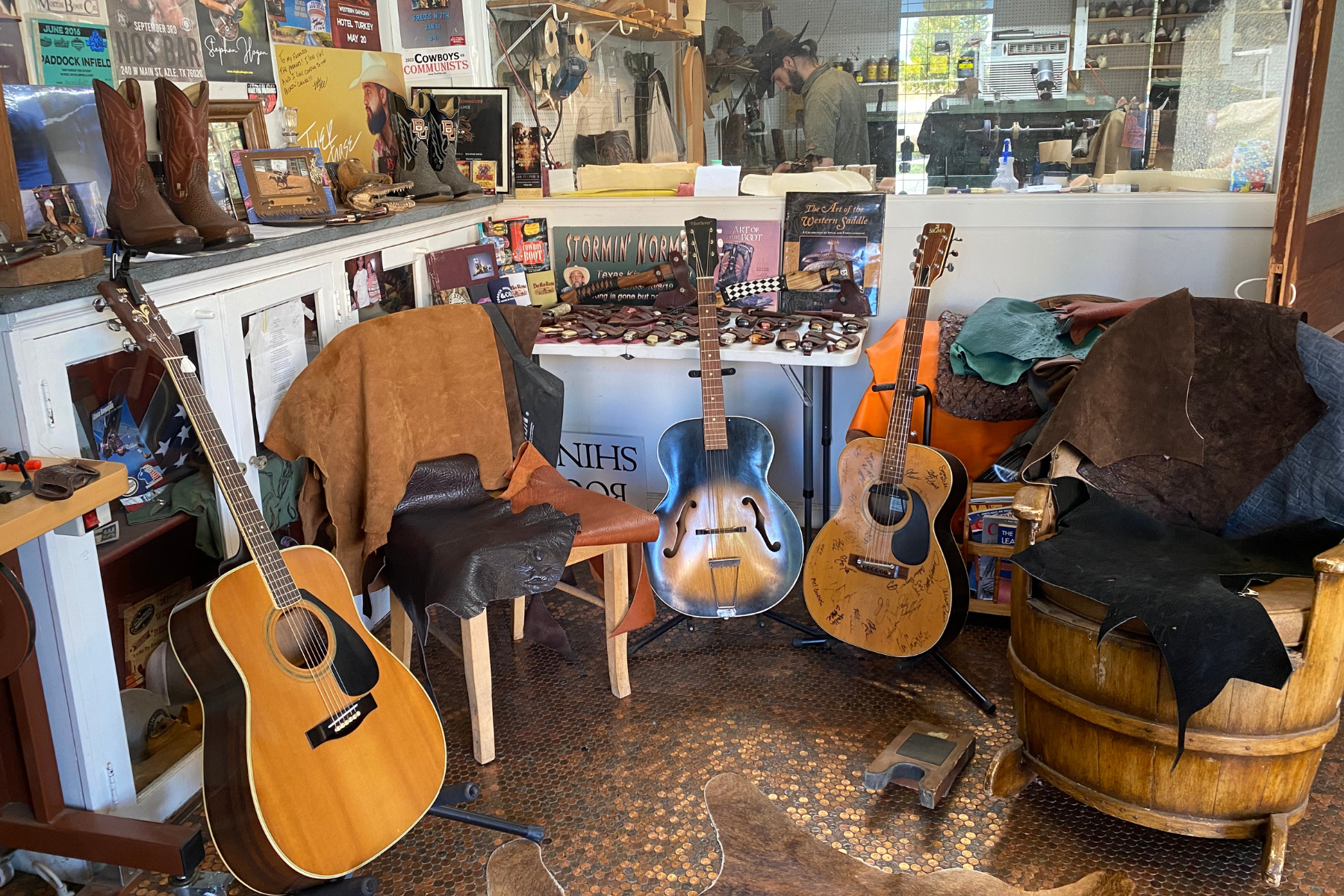
While his boots are beautiful, Parker’s boots are made to work, and they’re made to last. Most of their clients are real cowboys, he says. Many of them prefer durable pig-skin boots, which are resistant to cow’s urine. But if the cowboys are riding fences—checking the perimeter fences—they like the bull hides. Some, though, prefer luxury materials like alligator, ostrich, and elephant hides. “Now my rich cowboys, they like the hippos.” he says, hushing his voice. “You can literally kick a barbed wire fence with it and can’t tear it up.”
At Morris, each boot is made the old-fashioned way, Parker says. They measure their clients’ feet by hand on the manilla folders and run through a checklist with them to get a better idea of their lifestyle and preferred design. Then, the same person who measures the foot, makes the boot. This is key for Parker. It’s more than just knowing the foot, he says. “You got to know the person—how they walk, how they live, what they do on a daily basis, what they do on the weekend.” Start to finish, it takes about six-to-seven months for an order to be completed.
All that care is reflected in his prices. Parker’s normal, everyday bull hide boot is $1,100. Elephant and hippo boots, his best sellers, are $1,800. Full-quill ostrich boots are right at $2,000. A good chunk of their income comes from repair work—they do about 10 re-soles, $175 a pair, and one-to-three re-lasts, $500 a pair, a week.
As Parker continues to grow Morris Boot Co., he says he wants to get hooked up with the rodeo circuit. He wants to go to events and sell his custom boots. He takes on big commissions, too. During the pandemic, he outfitted the Six Shooters—the Texas Rangers’ take on cheerleaders. Next year, he’s making 100 alligator pairs for a golf course opening in Fort Worth. To get all the work done, Parker is working six days a week. “Every second we get, we’re making boots.”
He doesn’t mind, though. Parker says he feels like a kid in a candy store coming into work every day. He’ll never retire, either.
“One day,” he says, “they’ll find me back here dead with a boot in my hand.”
A fitting end for an old cowboy’s tale.
Get the AtHome Newsletter
Author



